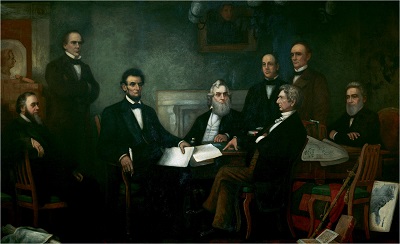Today’s installment concludes Lincoln’s Emancipation Proclamation,
the name of our combined selection from John Hay and by John G. Nicolay and Abraham Lincoln. The concluding installment, by Abraham Lincoln from Presidential Procomations, was published in 1862 and 1863. For works benefiting from the latest research see the “More information” section at the bottom of these pages.
If you have journeyed through all of the installments of this series, just one more to go and you will have completed nine thousand words from great works of history. Congratulations!
Previously in Lincoln’s Emancipation Proclamation.
Time: 1863
Place: The White House

Public domain image from Wikipedia.
Whereas, On the twenty-second day of September, in the year of our Lord one thousand eight hundred and sixty-two, a proclamation was issued by the President of the United States, containing, among other things, the following, to wit:
“That on the first day of January, in the year of our Lord one thousand eight hundred and sixty-three, all persons held as slaves within any State or designated part of a State the people whereof shall then be in rebellion against the United States, shall be then, thenceforward, and forever free; and the Executive Government of the United States, including the military and naval authority thereof, will recognize and maintain the freedom of such persons, and will do no act or acts to repress such per sons, or any of them, in any efforts they may make for their actual freedom.
“That the Executive will, on the first day of January afore said, by proclamation, designate the States and parts of States, if any, in which the people thereof respectively shall then be in rebellion against the United States; and the fact that any State, or the people thereof, shall on that day be in good faith represented in the Congress of the United States, by members chosen thereto at elections wherein a majority of the qualified voters of such State shall have participated, shall, in the absence of strong countervailing testimony, be deemed conclusive evidence that such State, and the people thereof, are not then in rebellion against the United States.”
Now, therefore, I, Abraham Lincoln, President of the United States, by virtue of the power in me vested as Commander-in Chief of the Army and Navy of the United States in time of actual armed rebellion against the authority and government of the United States, and as a fit and necessary war measure for suppressing said rebellion, do, on this first day of January, in the year of our Lord one thousand eight hundred and sixty-three, and in accordance with my purpose so to do, publicly proclaimed for the full period of one hundred days from the day first above mentioned, order and designate, as the States and parts of States wherein the people thereof respectively are this day in rebellion against the United States, the following, to wit: Arkansas, Texas, Louisiana (except the parishes of St. Bernard, Plaquemines, Jefferson, St. John, St. Charles, St. James, Ascension, Assumption, Terre Bonne, Lafourche, Ste. Marie, St. Martin, and Orleans, including the city of New Orleans), Mississippi, Alabama, Florida, Georgia, South Carolina, North Carolina, and Virginia (except the forty-eight counties designated as West Virginia, and also the counties of Berkeley, Accomac, Northampton, Elizabeth City, York, Princess Anne, and Nor folk, including the cities of Norfolk and Portsmouth), and which excepted parts are for the present left precisely as if this proclamation were not issued.
And by virtue of the power and for the purpose aforesaid, I do order and declare that all persons held as slaves within said designated States and parts of States are, and henceforward shall be, free; and that the Executive Government of the United States, including the military and naval authorities thereof, will recognize and maintain the freedom of said persons. And I hereby enjoin upon the people so declared to be free, to abstain from all violence, unless in necessary self-defence; and I recommend to them that, in all cases when allowed, they labor faithfully for reasonable wages.
And I further declare and make known that such persons, of suitable condition, will be received into the armed service of the United States, to garrison forts, positions, stations, and other places, and to man vessels of all sorts in said service.
And upon this act, sincerely believed to be an act of justice, warranted by the Constitution upon military necessity, I invoke the considerate judgment of mankind and the gracious favor of Almighty God.
In testimony whereof I have hereunto set my name and caused the seal of the United States to be affixed.
Done at the city of Washington this first day of January, in the year of our Lord one thousand eight hundred [L.S.] and sixty-three, and of the Independence of the United States the eighty-seventh.
ABRAHAM LINCOLN
By the President:
WILLIAM H. SEWARD, Secretary of State.
| <—Previous | Master List |
This ends our selections on Lincoln’s Emancipation Proclamation by two of the most important authorities of this topic:
- Abraham Lincoln, A History by John Hay and by John G. Nicolay published in 1890.
- Presidential Procomations by Abraham Lincoln published in 1862 and 1863.
Hay and Nicolay begins here. Abraham Lincoln begins here.
This blog features short and lengthy pieces on all aspects of our shared past. Here are selections from the great historians who may be forgotten (and whose work have fallen into public domain) as well as links to the most up-to-date developments in the field of history and of course, original material from yours truly, Jack Le Moine. – A little bit of everything historical is here.
More information on Lincoln’s Emancipation Proclamation here and here and below.
We want to take this site to the next level but we need money to do that. Please contribute directly by signing up at https://www.patreon.com/history

Leave a Reply
You must be logged in to post a comment.